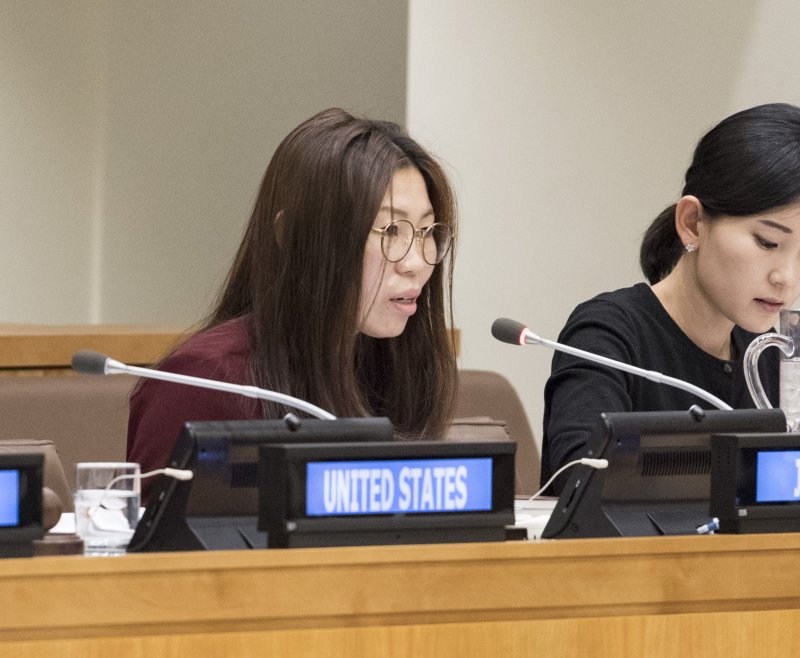Je Hyeon-a shared her story as a North Korean defector at a special event on human rights held Monday at United Nations headquarters in New York. Photo courtesy of United Nations
NEW YORK, Dec. 12 (UPI) -- North Korean defectors experience alienation in South Korea not only because of perceived discrimination, but also because of the sharp contrast between the two societies.
Je Hyeon-a, a North Korean defector who spoke Monday regarding the human rights situation at United Nations headquarters while seated next to U.S. Ambassador to the U.N. Nikki Haley, told UPI the differences between North and South accounted for her feelings of isolation.
Rather than pinning blame on inadequate South Korean government policies, or indifferent South Korean acquaintances, Je attributed her own feelings of isolation as a defector to historical circumstances that pushed the two Koreas down divergent roads.
"Once I came to South Korea, my mind became more hellish," Je said.
The statement may sound counterintuitive for someone like Je, who survived arrest and repatriation to North Korea three times, then was forced to undergo abortion while in North Korean detention.
Je said hunger stalked her at a prison camp for forced laborers, where guard dogs were brought in to eat the dead bodies that piled up as food became increasingly scarce at the facility.
After finally making her way to South Korea in 2007, and permanently leaving behind a country that imprisoned and incriminated her for traveling to China, bewilderment would override relief, Je said.
"That is because on one side of the line, there are people starving to death, and on the other side there are people throwing food out as leftovers," Je said, describing the contrast between the two Koreas that overwhelmed her as she adjusted to life in the South.
The slim and soft-spoken defector also said she was appalled when she heard South Koreans complain about their weight, an issue unimaginable to most North Koreans.
"That was another shock for me, when people say they need to go on a diet," Je said.
Je, who was introduced to Christianity when her mother began to bring Korean-language Bibles from China, along with food, says she currently attends church and is a devout Christian.
The disparities in wealth, her struggle with mundane South Korean preoccupations and survivor's guilt would invite new questions.
"I would find myself asking, how could God make such a world of sharp differences?" Je said.
Defectors experience contrasts when they first leave North Korea for China.
"When I first left North Korea for China, I thought China was heaven," she said.
Je, who said she was sold by human traffickers, and conceived a child with a Chinese husband, said a different kind of pain awaited her upon her arrival in South Korea, which she described as the "same country" as the North.
"When I went from China to South Korea, I felt like I was being torn apart," she said, describing the South as more of a "paradise" than China. "It is the same country, but something happened as it became divided."
As she coped with survivor's guilt, a full stomach did not necessarily translate into relief, or happiness.
"Whenever I would lift my spoon, filled with rice, to my lips, I felt like a criminal," she said.
"Because where I had come from, there was no rice and countless people died."
Je said the shock of the gap between the two Koreas can be difficult for defectors who feel despair after living by the lies of the North Korean regime.
The defector said her father, whose whereabouts are unknown, knew North Korea was deceiving ordinary people because he had found a way to tune in to South Korean radio during the rule of Kim Jong Il.
"He realized he had been fooled and misled his entire life," Je said.















